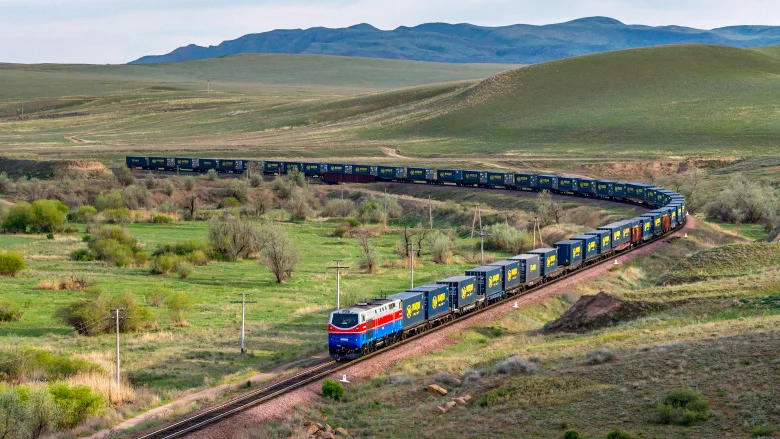BAKU, Azerbaijan, September 13. Global trade is shifting, and a new route between China and Europe—the Middle Corridor, also known as the Trans-Caspian International Transport Route (TITR)—is coming to the forefront. This corridor passes through Central Asia, the Caspian Sea, and the Caucasus, emerging as a key alternative to traditional trade routes.
In this new landscape, Turkmenistan-Türkiye cooperation plays a central role. Turkmenistan serves as the maritime gateway to Central Asia, while Türkiye functions as the western hub, opening access to Europe. Together, they create a new axis for global logistics, strengthening supply chain stability.
Turkmenistan sits pretty in a prime spot on the eastern shore of the Caspian Sea. Its key facility is the Turkmenbashi International Seaport, which can handle up to 17 million tons of cargo annually, including 400,000 containers. Along with ports in Kazakhstan and Azerbaijan, it ensures smooth transit along the corridor. To support maritime transport, Turkmenistan has already begun acquiring new ferries and cargo vessels.
In July 2025, the state agency Turkmendenizderyayollary announced a tender to design and build two Ro-Ro railway ferries and one cargo ship. This step reflects the growing demand for Caspian transit and is a strategic move to increase capacity. In the first nine months of 2024, cargo transported by sea and river reached 2,410 tons, an increase of 11.88 percent over the previous year.
Turkmenistan’s push to diversify transit routes is further evidenced by other projects. In early 2025, a new major rail freight route from China was launched, passing through Kazakhstan, Turkmenistan, Iran, and Türkiye, and reaching the EU border. This implementation demonstrates that Turkmenistan is not only participating in existing projects but also actively shaping and expanding new logistical arteries.
Alongside its maritime and rail transport, Turkmenistan is also spreading its wings in the realm of air cargo capabilities. The cargo terminal at Ashgabat International Airport is the largest and most modern air freight hub in the region, capable of handling up to 200,000 tons of cargo annually. This allows the country to transport not only containers but also time-sensitive goods, such as perishables and medical supplies, positioning Turkmenistan as a versatile logistics partner.
Turkish companies are actively involved in building Turkmenistan’s transport infrastructure, showcasing a relationship that’s more about strategic alliances than just cashing in.
Gap İnşaat, a Turkish company, executed the construction of the new Turkmenbashi port with an investment of $2 billion, representing a significant advancement in the modernization of Turkmenistan’s transportation infrastructure. Polimeks functioned as the principal contractor for the aviation hubs in Ashgabat and Turkmenbashi, catalyzing their evolution into pivotal regional logistics nodes. Ashgabat Airport has achieved a remarkable milestone by securing a position in the Guinness World Records for its unparalleled wingspan, establishing itself as the preeminent structure in this category. Additionally, both countries are working to remove potential bottlenecks. Customs authorities have discussed establishing a Simplified Customs Corridor to expedite procedures, and an agreement on international coordinated cargo transport was signed to optimize logistics processes.
The partnership between Turkmenistan and Türkiye is a whole new ball game, reaching far beyond the Middle Corridor and dipping its toes into various economic waters.
In 2024, trade between the two countries reached $2.17 billion and continues to grow. Türkiye has become one of Turkmenistan’s largest trading partners. Total Turkish investments in Turkmenistan exceed $200 million, representing a significant share of all foreign direct investment attracted by the country.
Turkish conglomerates, such as Çalık Holding (through its subsidiaries Gap İnşaat and Çalık Enerji) and Polimeks, participate in key projects, including power plants, industrial facilities, and the Olympic Village.
Turkish investments are helping Turkmenistan develop both traditional and emerging sectors. For example, the Turkish textile company Bursali invested $22.5 million in a new factory, creating approximately 1,000 jobs.
According to the World Bank, if countries keep pouring resources into the Middle Corridor, trade volumes might just skyrocket by 2030, while delivery times could be cut down to size. Presently, the journey from China to Europe takes a good 19-23 days; by 2027, it's expected to shave off some time and come down to 12-13 days.
Turkmenistan-Türkiye cooperation exemplifies how countries are leveraging global changes to achieve common goals. This partnership is evolving into a long-term strategic alliance, with both sides invested in the success of the Middle Corridor.







